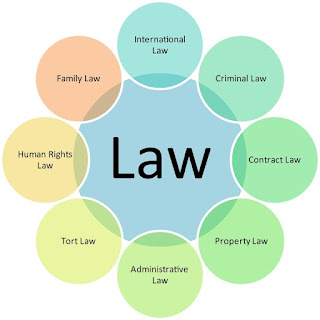There are several different types of law, each focusing on specific areas of legal practice. Many legal practitioners specialize in one or more areas based on their interests and expertise. Here are some of the main types of law:
Criminal Law: This type of law deals with offenses committed against the state or society. It encompasses crimes such as murder, theft, assault, and drug offenses. Criminal law governs the prosecution and punishment of individuals who violate these laws.
Civil Law: Civil law focuses on resolving disputes between individuals or organizations. It includes areas such as contracts, property, torts (personal injury and civil wrongs), family law, and employment law. Civil law cases generally involve one party seeking compensation or resolution for harm caused by another.
Constitutional Law: Constitutional law involves the interpretation and application of a country's constitution. It determines the powers and limitations of government entities, establishes fundamental rights, and ensures the protection of individual liberties. Constitutional law often involves issues of constitutional rights, such as freedom of speech, religion, and privacy.
Administrative Law: Administrative law governs the activities of administrative agencies and regulates the relationship between individuals and the government. It deals with the creation and operation of agencies, rulemaking, adjudication of disputes, and judicial review of agency decisions.
International Law: International law is concerned with the rules and principles governing relationships between nations. It covers treaties, diplomatic relations, human rights, international trade, armed conflicts, and the responsibilities of states in areas such as environmental protection and global health.
Corporate Law: Corporate law focuses on the legal aspects of running and organizing corporations and other business entities. It involves issues related to corporate governance, contracts, mergers and acquisitions, securities regulation, and commercial transactions.
Intellectual Property Law: Intellectual property law deals with legal rights and protections for intangible creations of the human intellect. It includes copyright, trademarks, patents, and trade secrets, aiming to encourage innovation and safeguard creators' and inventors' rights.
Environmental Law: Environmental law addresses legal issues related to the protection and preservation of the environment. It covers regulations on pollution control, resource management, land use, and conservation, aiming to promote sustainable practices and mitigate environmental harm.
Family Law: Family law focuses on legal matters involving familial relationships, such as marriage, divorce, child custody, adoption, and domestic violence. It deals with issues related to the family structure, rights, and obligations of family members.
Employment Law: Employment law governs the relationship between employers and employees. It covers areas such as hiring practices, workplace safety, discrimination, wages and benefits, termination, and workers' rights.
A traffic lawyer typically falls under the umbrella of criminal law, but their focus is specifically on violations of traffic laws and related offenses. Traffic lawyers handle cases involving traffic tickets, DUI (driving under the influence) or DWI (driving while intoxicated) charges, reckless driving, speeding, hit and run, and other traffic-related offenses.
While traffic violations are considered misdemeanors or infractions rather than serious crimes, they still involve legal consequences such as fines, license suspension, increased insurance premiums, and potential jail time. Traffic lawyers specialize in navigating the complex regulations and procedures associated with traffic offenses and aim to help their clients achieve the best possible outcome.
Traffic lawyers may assist their clients in various ways, including:
Legal Counsel: Providing advice and guidance regarding traffic laws, potential penalties, and available legal options.
Case Evaluation: Assessing the circumstances surrounding the traffic offense and determining the strength of the case, identifying any possible defenses.
Negotiations: Communicating with prosecutors or law enforcement to negotiate reduced charges, lower fines, or alternative penalties.
Court Representation: Representing clients in court proceedings, presenting arguments, cross-examining witnesses, and advocating for their client's interests.
License Restoration: Assisting clients in appealing license suspensions, seeking restricted driving privileges, or working towards license reinstatement.
Record Expungement: Helping clients clear their driving records of certain traffic offenses or minimize the long-term impact on their driving history.
While traffic lawyers primarily handle cases within the realm of traffic offenses, some may also offer services related to other areas of law, such as DUI defense, personal injury resulting from car accidents, or defending clients in cases involving traffic-related fatalities.
The specific responsibilities and scope of practice for a traffic lawyer may vary depending on local laws and regulations.











